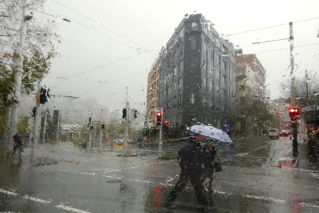‘Sorry about that, kids’: Alan Kohler Boomer video goes viral

A clip of finance guru Alan Kohler which exposes the “great divide” in wealth between Baby Boomers and younger generations has resurfaced after the Reserve Bank’s latest rate rise.
In the short video which is doing the rounds again, Kohler – a regular The New Daily columnist – points out who is suffering most from the ongoing interest rates rises, and it’s not the older generations.
In fact, Kohler points out that Baby Boomers are sitting pretty and actually increasing their wealth while Millennials and Generation Z are going backwards in their finances.
The high-rolling Boomers are also spending more and undermining efforts to pull back Australia’s worrying inflation, Kohler points out.
Kohler was commenting on data from a Commonwealth Bank of Australia presentation.
“Some interesting results from CBA’s results presentation, and they all highlight the great divide between generations,” Kohler says in the video which was initially broadcast on the ABC several weeks ago.
“Millennials have most of the debt, Baby Boomers have most of the savings,” he says, indicating a graph that shows loans and deposit balances, with those aged 25 to 54 holding most of the loans.
“Generation Z and Millennials are eating into what savings they have; Boomers are growing their savings,” Kohler continues, showing a table where the over 65s hold 43 per cent of deposits.
“And Generation Z and Millennials are cutting back their spending and therefore doing all the hard work, helping the Reserve Bank get inflation down.
“But Baby Boomers are spending more and undermining that effort.”
Kohler concludes the segment: “Sorry about that, kids.”
Kohler is one of a number of economists who have highlighted the impact of rich Boomers and high corporate profits on rampant inflation which the RBA is trying to contain with its rate rises.
Homeowners were stung with another interest rate hike this week, with the official cash rate rising 25 basis points to 4.35 per cent.
It was the 13th in the Reserve Bank’s fight against inflation and had been widely expected by economists amid persistent price pressures.
Three of Australia’s biggest banks hiked interest rates in response to the Reserve Bank’s latest cash rate increase.
Major banks NAB, ANZ and Westpac on Wednesday passed the interest rate increase onto their variable rate borrowers, as well as select savings accounts.
The RBA’s 13 rate hikes have collectively have added $1210 to monthly repayments.
RateCity analysis finds the average variable rate mortgage holder with a $500,000 loan will be slugged an extra $76 a month once the hike is passed on.
The 13 rate hikes collectively have added $1210 – or 52 per cent – to monthly repayments.
Economists at Commonwealth Bank, AMP Australia and elsewhere expect the November hike to be the last, but RBA governor Michele Bullock kept the possibility of more tightening alive in her post-meeting statement.
NAB economists are among those expecting one more interest rate hike but not until February, after the December quarter inflation numbers are released.
Rich Insight economist Chris Richardson said the bank “softened its words just a little” in relation to the need for future interest rate hikes.
“Now that it’s put an extra notch on the belt, an extra swing of the baseball bat, is it starting to hope that it doesn’t need to do it again? That would be my hope too,” Mr Richardson told Sky News on Wednesday.
More tightening may be needed if there’s another shock that adds to inflation pressures, such as an escalation of the Middle East conflict.
Governments have also been under pressure to do more to combat inflation.
Assistant Treasurer Stephen Jones said the federal government was exercising fiscal restraint so it didn’t fuel inflation.
-with AAP








